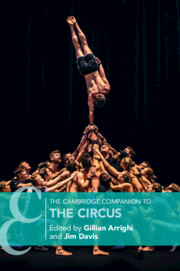Book contents
- The Cambridge Companion to the Circus
- Cambridge Companions to Theatre and Performance
- The Cambridge Companion to the Circus
- Copyright page
- Contents
- Figures
- Contributors
- Acknowledgements
- Timeline
- Introduction
- Part I Transnational Geographies of the Modern Circus
- Part II Circus Acts and Aesthetics
- Part III Circus
- Chapter 11 Circus and Somatic Spectacularity on Stage in the Variety Era
- Chapter 12 Becoming an Art Form
- Chapter 13 Risky Play and the Global Rise in Youth Circus
- Chapter 14 Social Circus
- Part IV Circus Studies Scholarship
- Bibliography
- Index
- References
Chapter 12 - Becoming an Art Form
From ‘Nouveau Cirque’ to Contemporary Circus in Europe
from Part III - Circus
Published online by Cambridge University Press: 22 June 2021
- The Cambridge Companion to the Circus
- Cambridge Companions to Theatre and Performance
- The Cambridge Companion to the Circus
- Copyright page
- Contents
- Figures
- Contributors
- Acknowledgements
- Timeline
- Introduction
- Part I Transnational Geographies of the Modern Circus
- Part II Circus Acts and Aesthetics
- Part III Circus
- Chapter 11 Circus and Somatic Spectacularity on Stage in the Variety Era
- Chapter 12 Becoming an Art Form
- Chapter 13 Risky Play and the Global Rise in Youth Circus
- Chapter 14 Social Circus
- Part IV Circus Studies Scholarship
- Bibliography
- Index
- References
Summary
New circus/nouveau cirque is an artistic movement that circus historian Martine Maléval locates between 1968 and the 1990s. It can be described as both an aesthetic and a political revolution that was rooted in the dynamics of the social and cultural revolutions of the 1970s. For numerous reasons this period can be identified as the source of a renewed institutionalisation of the circus that is still ongoing. Commencing with the professional careers of circus artists who were active in the 1970s and the 1980s, this chapter examines how these artists progressively defined themselves as ‘circus authors’, how they promoted innovation in the aesthetics and practices of the circus, and how they generated a long-term impact on local cultural policies and the social status of contemporary circus artists in Europe. The process through which new circus emerged and evolved can be understood using the concept of ‘artification’ (becoming an art form), a term used by the French sociologist Nathalie Heinich and subsequently applied to circus studies by Magali Sizorn. Using Maléval’s foundational research on the French nouveau cirque as its point of departure, this chapter adopts a European-wide perspective to examine the influence of new circus from the 1990s until today.
Keywords
- Type
- Chapter
- Information
- The Cambridge Companion to the Circus , pp. 188 - 202Publisher: Cambridge University PressPrint publication year: 2021



